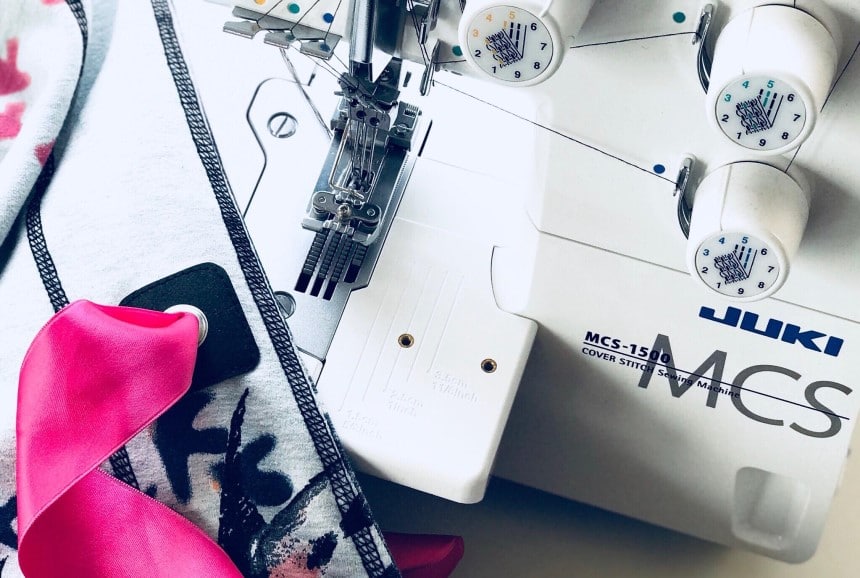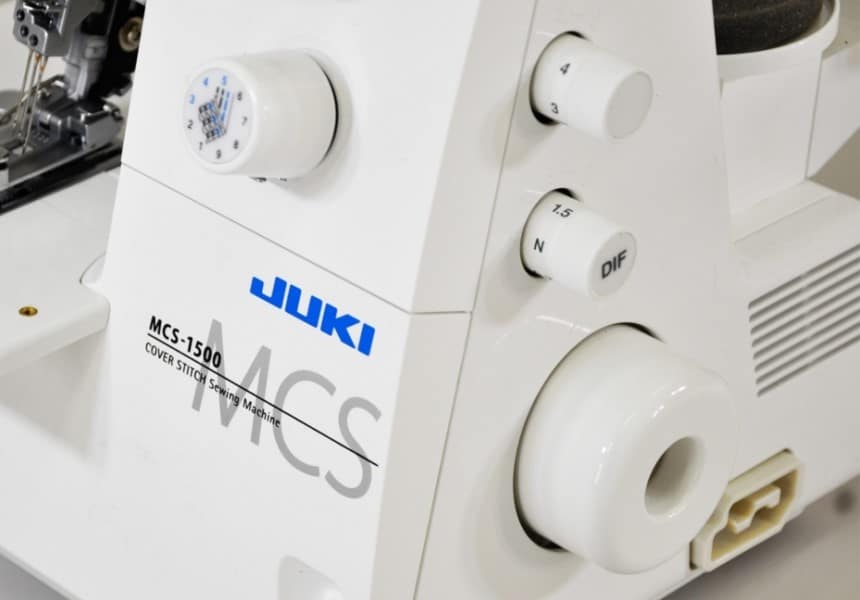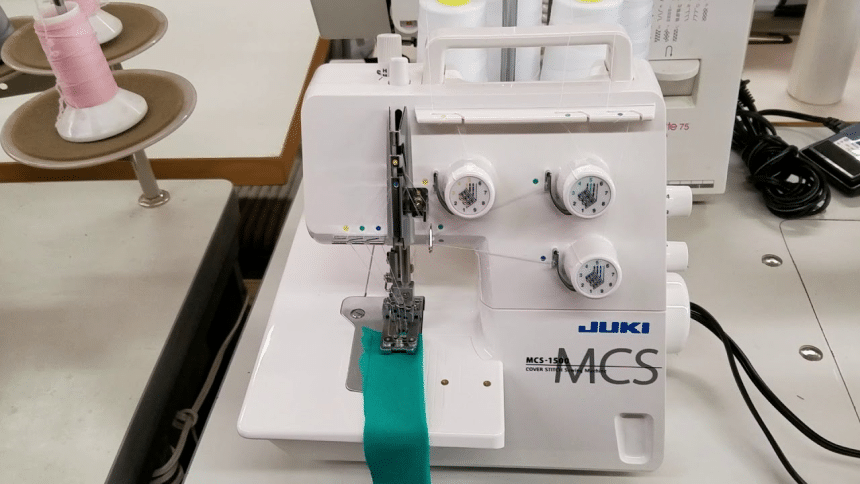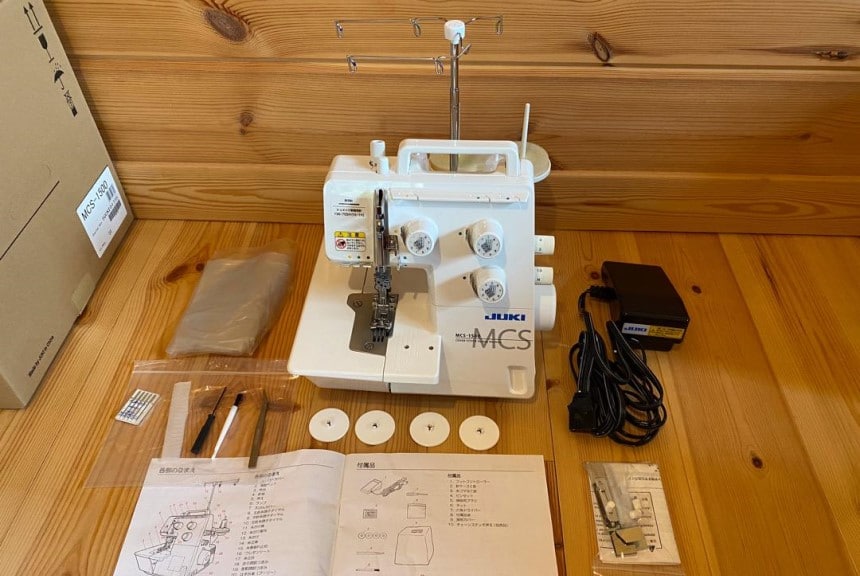



Made based on its predecessor, the Juki MO600 machine, the Juki MCS-1500 offers unique features found in coverstitch machines of this kind. This stand-alone model makes for simple and beautiful cover stitches without getting stuck, easily switching from layer to layer.
It’s a mid-range stitching machine that is suitable for many different applications. It is useful for decorative sewing of single necklines, sleeves, as well as hems. It can also make a strong chain stitch. It’s ideal for sewing side seams of pants. To help you make an informed purchase decision, in this JUKI MCS-1500 review, we’ll help you discover its strength and also its downsides by analyzing its specs and features.
From its features and functionality to the pros and cons of the cover stitch machine, we’ll review what this machine can offer you.

It is equipped with a higher presser foot lifter at one end so that the fabric can be easily inserted when starting to sew. The first presser foot position can be raised to 10 millimeters or 0.393701 inches
There’s the simple looper threading (just press the button). You also have an adjustable differential feed that allows for gorgeous finishes, even with stretch knit fabrics, pure silk, or rayon crepe.
This machine is also equipped with an extension plate with printed sewing guidelines, adjustable presser foot tension (depending on the type of fabric being sewn), and an outer thread cutter.
With chain stitch, the lower thread forms a chain on the back of the fabric, the stitch is more durable when stretched out and ideal for sewing at the waist and sides of the pants.
You can adjust the differential transport and obtain perfect finishes, even with elastic fabrics like knits and georgette.
The machine can be easily threaded by lowering it with the push of a button.
The pressure of the foot can be adjusted according to the type of fabric to be sewn ensuring professional results.
The foot has a toe that makes it easy to insert the fabric at the start of sewing without having to lift the foot manually. In addition, the lifting of the lever to the first position of the foot is up to 10mm.
The foot with guide is supplied as a standard accessory and presses on the right and left sides allowing you to perform precise seams, even on clothes that are not perfectly even.
The outer cutter is useful when removing fabric after lifting the foot at the end of the seam.
This is a three-needle four-thread cover stitch machine. What that means is it has three needles and so you have three needle threads. It also has a fourth looper thread and unlike an overlocker, you only have one looper thread.
The machine can make chain and cover stitches. The cover stitch is ideal for sewing applications like necklines, simple hems, and sleeve cuffs. The chain stitch is very useful for applying simple hems, cuffs, collars, and necklines, essential for elastic fabrics. The bottom stitch creates a chain shape on the wrong side of the fabric. This makes the seam very strong. The chain stitch can also be used as a finishing seam of the collars.
The stitch width of the machine is 2.5 to 5 mm. This machine has a stitch length that can go from 1mm to 4mm.
The average stitch length of new machines however is 2.5mm but you have 0 to 4 mm as the typical range and the range for stitch width is 0 to 5 mm. Generally, with a 2.5 mm length, you’ll be able to make 10 to 12 stitches per inch.
The Juki cover stitch machine can make stitches at a maximum speed of 1350 stitches per minute (SPM). That’s not disappointing, neither is it too slow, considering its price. This makes it an ideal machine for professionals for semi-industrial and commercial use. It also has the user-friendliness that makes it ideal for beginners at home.

The threading of the hook (usually uncomfortable) is facilitated by a button that allows you to release it so that it is in a comfortable position for threading. The thread cutter located to the left of the presser foot lever is also very handy for cutting threads at the end of the seam.
We were impressed that the machine, unlike all other similar models, uses standard needles for normal sewing machines. So it is possible to use the needles that are found everywhere without having to search for special needles that are almost unobtainable.
The cover stitch machine is a heavy-duty machine for all types of fabrics. However, it is most suitable as a homeowner machine and may not be as durable for industrial use or heavy-duty professional use.
It has three needles that make it capable of making long-lasting and professional seem finish-ups. The Juki MCS-1500 weighs 19.8 pounds and measures 15.5 x 13.5 x 14 inches.
Many users attest to its durability online, saying they haven’t had problems with it – no skipped stitches, no frequently broken thread problems.
The Juki MCS 1500 comes with 5 years warranty on the mechanical parts and 2 years warranty on the electrical. Regardless of its warranty, it’s reliable overall.

Most domestic cover stitch machines have what we call the take-up levers. And that’s one of the defining differences between the JUKI MCS 1500 and most of the other home-based cover stitch machines. The thread take-up system is what takes out the slack of the thread to set the stitch and that’s a really important part of any sewing, overlock, or cover stitch machine.
It’s very different from every other domestic type machine on the market and it’s one of the reasons the Juki machine stitches so well.
The feeding system is perfect. It has a differential feed mechanism that allows you to stretch or gather the fabric. You can use the differential feed system to prevent unwanted gather or stretch in the fabric.
The differential feed mechanism is essential for adjusting the mechanism that is used to feed your material under the needle called a feed dog. If you have a differential feed, you can adjust exactly how the fabric is fed to eliminate seam ripples, stretching, and creases. The quality of your stitches will be improved, which is crucial anytime you are working with knitted, stretch, or superfine fabrics. You can also make decorative ruffle borders.
The presser foot is raised more on the front to facilitate the introduction of the material. In addition, there are two lifting positions, 8mm and 10mm. This, therefore, makes it possible to insert and work on thick layers of fabric.
The presser foot also has a guide compensated on the right and the left. This allows for better guidance of the material. The thread cutter on the outside makes it easy and quick to release the material after raising the presser foot at the end of the seam.

The machine is not in the entry-level range as far as price is concerned. However, it’s still well under the $1,000 range and many users express that it’s worth the price. It’s still a lot more cost-effective, considering its reliability and functionality.
| PROS |
CONS |
|
|
The Juki MCS-1500 lets you expand your creativity with its wide range of features and professional-looking stitches. It’s a specialized chain stitch and cover stitch machine for professional use. As we’ve emphasized in the JUKI MCS-1500 review, its 3 and 4-thread sewing is perfect for a variety of applications, such as hemming, cuffs, and necklines.